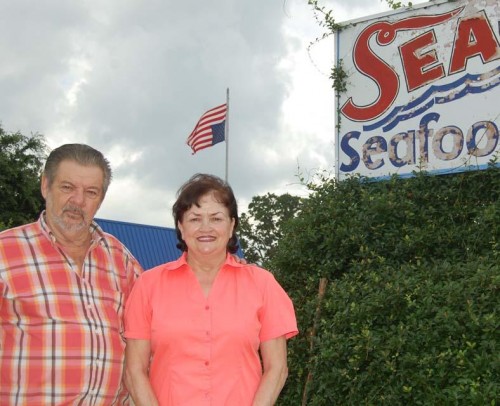
Melanie Reed
June 25, 2010Rose Pratt
June 29, 2010For more than 30 years, an American flag has flown in front of Sea-Go Seafood in Houma.
But since the oil spill and the subsequent deepwater drilling moratorium, owner Arthur Eschete flipped the flag and began flying it upside-down – not as a sign of disrespect but as a sign of distress.
“I had people call and say, ‘Do you know your flag is upside down?’ and I said, ‘Yes, that’s a distress signal,'” Eschete explained. “We’re in distress now. I just hope we can weather through it.”
The closure of fishing areas throughout Terrebonne and Lafourche parishes has created difficulty for local seafood retailers to continue acquiring seafood at a reasonable price.
Eschete said the price of shrimp, oysters and crawfish has gone up 30- to 40 percent since the closures, and he is actually unable to buy fresh crabs now.
“I usually get crabs down here out of Bayou Dularge and some out of a retailer in Morgan City, but a lot of the crabbers that he buys from fish in the areas [that are] closed,” said Eschete. “You got to chase it, and when you do chase it, the price is high. Right now, the crab quality is poor because you have to take what’s there.”
Even though crawfish isn’t directly affected by closures because they are harvested north of Morgan City, Eschete said the lack of other types of seafood has flooded the crawfish market, limiting the demand and raising the price.
“If you don’t have any crabs and shrimp are real expensive, people will revert to the other, which is crawfish,” he said.
The price hikes local seafood restaurant owners have endured isn’t nearly as expensive as what the rest of the country normally pays. Knowing that prices are inclined to climb the further north his suppliers are; Eschete is not considering shopping for new retailers. It would ultimately just drive the Houma restaurateur’s prices even higher.
“Down here, we’re right in the middle of where the seafood comes from, so the people down here aren’t going to pay a high price for shrimp or crabs,” he said.
Making matters worse, Eschete fears the moratorium will cost his customers their jobs, further limiting his business.
“In Terrebonne, Lafourche, and pretty much St. Mary, [residents] live and die on the seafood and drilling industry. They [the two industries] work hand-in-hand,” said Eschete. “We need the drilling to go on for people to be able to afford to buy the seafood we do have and vise versa.”
Ewell Smith, executive director of the Louisiana Seafood Promotion & Marketing Board, agrees the moratorium is destructive to Louisiana’s seafood industry.
“The president is going to kill us with this,” said Smith. “Look how closely tied fishing families are to oil families. If a family is relying on oil, gas and seafood income, and all of the sudden the president is going to knock that out of the equation, that’s going to be devastating to us.”
Smith said the board has sent delegates to Washington, D.C., on three separate occasions to “work with our legislatures to make sure [BP] relief gets down to our fishermen.”
The seafood board director estimates much of the state’s seafood is still intact: 30 to 40 percent of oyster production; 30 percent of shrimp; and 60 to 70 percent of fin fish and crab. However, nearly 100 percent of the state’s eastern offshore and inshore fish production have been negatively impacted.
“We still have a significant amount of fishing happening,” Smith continued. “We need to make sure we can keep these markets alive and well. The president coming out and stating seafood is safe is a big help, and, of course, the experts of all the different health agencies would let him know that.”
But even with President Barack Obama’s backing, Smith knows keeping the national perception that Louisiana seafood from the state’s western waters and inshore areas is safe to eat will be extremely difficult.
“Our brand has been beaten up so terribly,” said Smith. “People tuned in on the coastal areas understand this, that there are safe areas far away from the oil; but when you’re in Kansas, you don’t know that.”
Eschete said he has not seen locals doubt the safety of his seafood, but business has noticeably decreased. But with gallons of oil continuing to pour into the Gulf of Mexico, he fears the Deepwater Horizon explosion could force neighborhood seafood retailers to relocate or shutter their doors completely.
“We probably can sweat it out more than some of our younger people, but a lot of the younger people will just have to move,” said Eschete. “I don’t know what will be left for any of us.”
It’s a scenario that worries Smith. He said losing frontline seafood retailers would devastate the industry. It’s his hope that coastal-area businesses like Sea-Go Seafood can hang on until the oil rig is plugged.
“The chefs in Louisiana are some of the most creative people you’re ever going to have,” said Smith. “Hopefully, if they can’t get one specific species, they turn to other species of Louisiana seafood. They need to do what they need to do to survive, because we’re going to need them there for the long term.”
Arthur and Linda Eschete stand outside their Houma business, Sea-Go Seafood, which is adorned with an upside-down American flag in the parking lot. * Photo by RICHARD FISCHER








